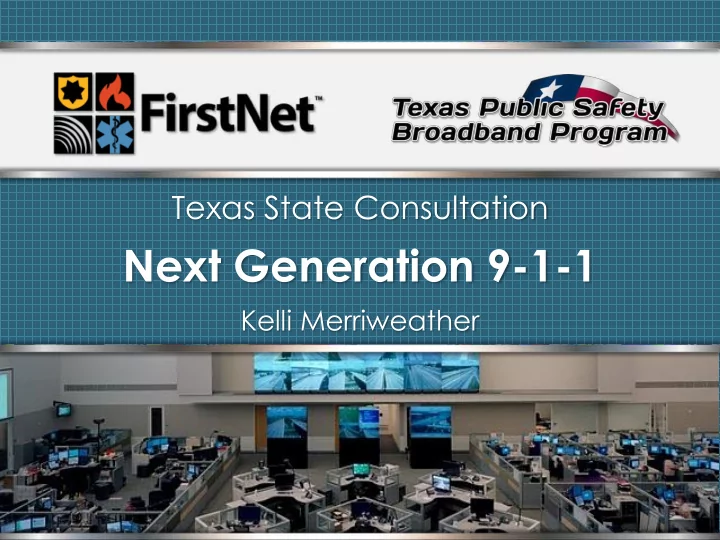

Texas State Consultation Next Generation 9-1-1 Kelli Merriweather
Overview Texas 9-1-1 Landscape CSEC NG9-1-1 Master Plan Emergency Services IP Networks CSEC State-level ESInet Regional & Local ESInets
Texas 9-1-1 Landscape 9-1- 1 service is statutorily defined as… “a communication service that connects users to a Public Safety Answering Point (PSAP) through a 9-1- 1 system.” Health & Safety Code, Chapter 771.001(6)
Texas 9-1-1 Landscape 9-1-1 service is overseen and funded by three types of 9-1-1 Entities 23 Regional Planning Commissions 25 Emergency Communications Districts 26 Municipal Emergency Communications Districts
Heading Text
Texas 9-1-1 Landscape PSAPs in Texas 9-1-1 Entities PSAPs Counties Regional Planning Commissions 322 204 Emergency Communications Districts 238 43 Municipal Emergency Communications Districts 27 7 Total Statewide 587 254
Texas 9-1-1 Landscape Regional Planning Commissions Authorized in Health & Safety Code, Chapter 771, State Administration of Emergency Communications CSEC State Program State Designated Planning Regions Texas Association of Regional Councils (TARC)
Texas 9-1-1 Landscape Emergency Communications Districts Authorized in Health & Safety Code, Chapter 772, Local Administration of Emergency Communications Independent of the CSEC program Primarily Metropolitan County Areas Texas 9-1-1 Alliance
Texas 9-1-1 Landscape Municipal Emergency Communications Districts Recognized in Health & Safety Code, Chapter 771.001(3)(A) Independent of the CSEC program Municipalities – large & small Municipal Emergency Communications Districts Association (MECDA)
Texas 9-1-1 Landscape CSEC Collaborates with 9-1-1 Entities through: Texas Association of Regional Councils (TARC) Texas 9-1-1 Alliance Municipal Emergency Communications Districts Association (MECDA)
CSEC NG9-1-1 Master Plan Purpose: Communicate the Vision Engage Stakeholders Chart the Course Appendix to CSEC Strategic Plan for Statewide 9-1-1 Service
CSEC NG9-1-1 Master Plan Strategic Direction & Long Range Policy System & Transition Overview Funding, Governance, Legal/Regulatory System Management & Operation Resource Sharing Supporting Radio Interoperability
ESInet – Backbone of NG911 Emergency Service Internet Protocol Network (ESInet) “A private IP network or Virtual Private Network that is used for communications between and among PSAPs and other entities that support or are supported by PSAPs in providing emergency call handling and response. ” H&S Code 771.0511
Benefits of ESInets Enables enhanced redundancy & backup Improves interoperability among PSAPs Efficiency through centralized solutions & retirement of legacy technology Resource Sharing Supporting Radio Interoperability
CSEC State-level ESInet Address Generational Technology Issues Enable & Facilitate Text to 9-1-1 Establish a standards-based system Transition to Geospatial Data for location validation and call routing
CSEC State-level ESInet Multiphase Effort FY 2014 – 2015 – Phase I FY 2016 – 2017 – Phase II FY 2018 – 2019 – Phase III
Regional ESInets CSEC NG9-1-1 Master Plan: “The Texas NG9-1-1 System will be realized with the implementation of a state-level Emergency Services Internet Protocol (IP)-enabled Network (ESInet) that will interconnect regional ESInets and individual PSAPs .”
Regional ESInets Regional ESInets (implemented and/or planned): 10 Individual ECDs 4 RPCs in the CSEC program PSAP-to-PSAP IP Connectivity 7 RPCs - 127 PSAPs 36 ECDs - 129 PSAPs
Recommend
More recommend